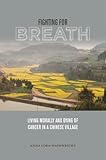Fighting for Breath : Living Morally and Dying of Cancer in a Chinese Village / Anna Lora-Wainwright.
Material type: TextPublisher: Honolulu : University of Hawaii Press, [2013]Copyright date: ©2013Description: 1 online resource (320 p.) : 10 b&w images, 1 map, 1 chartContent type:
TextPublisher: Honolulu : University of Hawaii Press, [2013]Copyright date: ©2013Description: 1 online resource (320 p.) : 10 b&w images, 1 map, 1 chartContent type: - 9780824836825
- 9780824837976
- 362.19699/43200951 23
- RC279.C6 L67 2013
- online - DeGruyter
- Issued also in print.
| Item type | Current library | Call number | URL | Status | Notes | Barcode | |
|---|---|---|---|---|---|---|---|
 eBook
eBook
|
Biblioteca "Angelicum" Pont. Univ. S.Tommaso d'Aquino Nuvola online | online - DeGruyter (Browse shelf(Opens below)) | Online access | Not for loan (Accesso limitato) | Accesso per gli utenti autorizzati / Access for authorized users | (dgr)9780824837976 |
Browsing Biblioteca "Angelicum" Pont. Univ. S.Tommaso d'Aquino shelves, Shelving location: Nuvola online Close shelf browser (Hides shelf browser)

|

|

|

|

|

|

|
||
| online - DeGruyter Brothers under a Same Sky / | online - DeGruyter China's Contested Capital : Architecture, Ritual, and Response in Nanjing / | online - DeGruyter Drinking Smoke : The Tobacco Syndemic in Oceania / | online - DeGruyter Fighting for Breath : Living Morally and Dying of Cancer in a Chinese Village / | online - DeGruyter Passing the Light : The Incense Light Community and Buddhist Nuns in Contemporary Taiwan / | online - DeGruyter Potent Landscapes : Place and Mobility in Eastern Indonesia / | online - DeGruyter Three-Dimensional Reading : Stories of Time and Space in Japanese Modernist Fiction, 1911-1932 / |
Frontmatter -- Contents -- Acknowledgments -- Guide to Key Places and People -- Introduction -- Chapter 1: Cancer and Contending Forms of Morality -- Chapter 2: The Evolving Moral World of Langzhong -- Chapter 3: Water, Hard Work, and Farm Chemicals: The Moral Economy of Cancer -- Chapter 4: Gendered Hardship, Emotions, and the Ambiguity of Blame -- Chapter 5: Xiguan, Consumption, and Shifting Cancer Etiologies -- Chapter 6: Performing Closeness, Negotiating Family Relations, and the Cost of Cancer -- Chapter 7: Perceived Efficacy, Social Identities, and the Rejection of Cancer Surgery -- Chapter 8: Family Relations and Contested Religious Moralities -- Conclusion -- Appendix 1: Questionnaire (English Translation) -- Appendix 2: List of Pesticides Used in Langzhong and Their Health Effects -- Notes -- References -- Index
restricted access online access with authorization star
http://purl.org/coar/access_right/c_16ec
Numerous reports of "cancer villages" have appeared in the past decade in both Chinese and Western media, highlighting the downside of China's economic development. Less generally known is how people experience and understand cancer in areas where there is no agreement on its cause. Who or what do they blame? How do they cope with its onset? Fighting for Breath is the first ethnography to offer a bottom-up account of how rural families strive to make sense of cancer and care for sufferers. It addresses crucial areas of concern such as health, development, morality, and social change in an effort to understand what is at stake in the contemporary Chinese countryside.Encounters with cancer are instances in which social and moral fault lines may become visible. Anna Lora-Wainwright combines powerful narratives and critical engagement with an array of scholarly debates in sociocultural and medical anthropology and in the anthropology of China. The result is a moving exploration of the social inequities endemic to post-1949 China and the enduring rural-urban divide that continues to challenge social justice in the People's Republic. In-depth case studies present villagers' "fight for breath" as both a physical and social struggle to reclaim a moral life, ensure family and neighborly support, and critique the state for its uneven welfare provision. Lora-Wainwright depicts their suffering as lived experience, but also as embedded in domestic economies and in the commodification of care that has placed the burden on families and individuals. Fighting for Breath will be of interest to students, teachers, and researchers in Chinese studies, sociocultural and medical anthropology, human geography, development studies, and the social study of medicine.
Issued also in print.
Mode of access: Internet via World Wide Web.
In English.
Description based on online resource; title from PDF title page (publisher's Web site, viewed 02. Mrz 2022)


